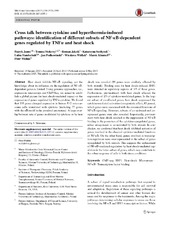| dc.contributor.author | Janus, Patryk | en_US |
| dc.contributor.author | Stokowy, Tomasz | en_US |
| dc.contributor.author | Jaksik, Roman | en_US |
| dc.contributor.author | Szoltysek, Katarzyna | en_US |
| dc.contributor.author | Handschuh, Luiza | en_US |
| dc.contributor.author | Podkowinski, Jan | en_US |
| dc.contributor.author | Widlak, Wieslawa | en_US |
| dc.contributor.author | Kimmel, Marek | en_US |
| dc.contributor.author | Widlak, Piotr | en_US |
| dc.date.accessioned | 2016-03-07T11:11:33Z | |
| dc.date.available | 2016-03-07T11:11:33Z | |
| dc.date.issued | 2015-05-06 | |
| dc.Published | Molecular Genetics and Genomics 2015, 290(5):1979-1990 | eng |
| dc.identifier.issn | 1617-4623 | |
| dc.identifier.uri | https://hdl.handle.net/1956/11455 | |
| dc.description.abstract | Heat shock inhibits NF-κB signaling, yet the knowledge about its influence on the regulation of NF-κB-dependent genes is limited. Using genomic approaches, i.e., expression microarrays and ChIP-Seq, we aimed to establish a global picture for heat shock-mediated impact on the expression of genes regulated by TNFα cytokine. We found that 193 genes changed expression in human U-2 osteosarcoma cells stimulated with cytokine (including 77 genes with the κB motif in the proximal promoters). A large overlap between sets of genes modulated by cytokine or by heat shock was revealed (86 genes were similarly affected by both stimuli). Binding sites for heat shock-induced HSF1 were detected in regulatory regions of 1/3 of these genes. Furthermore, pre-treatment with heat shock affected the expression of 2/3 of cytokine-modulated genes. In the largest subset of co-affected genes, heat shock suppressed the cytokine-mediated activation (antagonistic effect, 83 genes), which genes were associated with the canonical functions of NF-κB signaling. However, subsets of co-activated and co-repressed genes were also revealed. Importantly, pre-treatment with heat shock resulted in the suppression of NF-κB binding in the promoters of the cytokine-upregulated genes, either antagonized or co-activated by both stimuli. In conclusion, we confirmed that heat shock inhibited activation of genes involved in the classical cytokine-mediated functions of NF-κB. On the other hand, genes involved in transcription regulation were over-represented in the subset of genes upregulated by both stimuli. This suggests the replacement of NF-κB-mediated regulation by heat shock-mediated regulation in the latter subset of genes, which may contribute to the robust response of cells to both stress conditions. | en_US |
| dc.language.iso | eng | eng |
| dc.publisher | Springer | eng |
| dc.rights | Attribution CC BY | eng |
| dc.rights.uri | http://creativecommons.org/licenses/by/4.0/ | eng |
| dc.subject | ChIP-seq | eng |
| dc.subject | HSF1 | eng |
| dc.subject | Heat shock | eng |
| dc.subject | Microarrays | eng |
| dc.subject | NF-κB | eng |
| dc.subject | Transcription factor binding | eng |
| dc.title | Cross talk between cytokine and hyperthermia-induced pathways: identification of different subsets of NF-κB-dependent genes regulated by TNFα and heat shock | en_US |
| dc.type | Peer reviewed | |
| dc.type | Journal article | |
| dc.date.updated | 2015-11-10T13:02:58Z | |
| dc.description.version | publishedVersion | en_US |
| dc.rights.holder | Copyright 2015 the authors | |
| dc.identifier.doi | https://doi.org/10.1007/s00438-015-1055-1 | |
| dc.identifier.cristin | 1248374 | |
| dc.subject.nsi | VDP::Medisinske fag: 700::Basale medisinske, odontologiske og veterinærmedisinske fag: 710::Medisinsk genetikk: 714 | |
| dc.subject.nsi | VDP::Midical sciences: 700::Basic medical, dental and veterinary sciences: 710::Medical genetics: 714 | |

